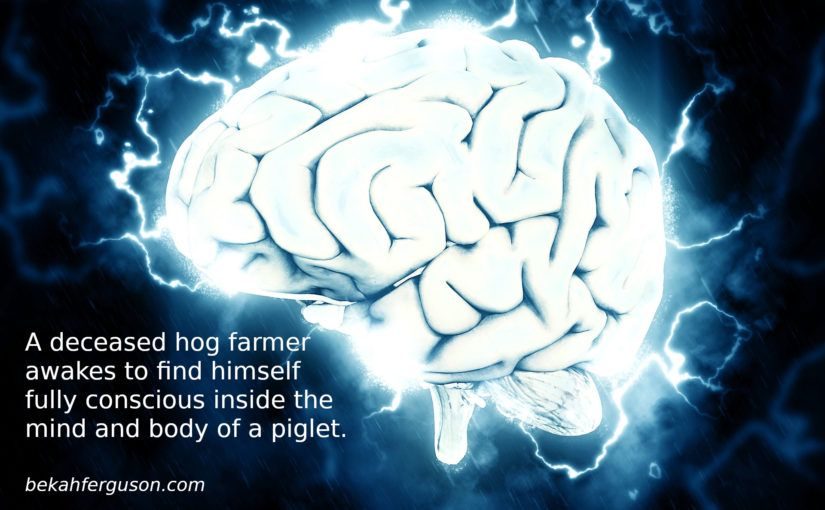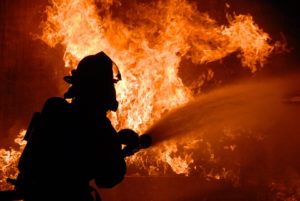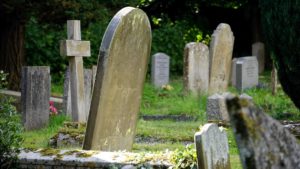It had happened the day after Halloween, two weeks after Melvin’s sixteenth birthday.
An explosion in the confinement barn late that night started a voracious, unquenchable fire. Howard and Beverly had flung themselves from their bed at the sound of it—a bang that rattled the very walls of their house—and after tugging on their rubber boots, rushed outside where already the acrid scent of smoke stung their eyes and nostrils.
Billows of red smoke silhouetted the black sky above.
Melvin and Toby were at their side within minutes. “I’ve called the fire department,” Melvin exclaimed as he continued on past them, hurrying toward the burning building.
“Melvin—wait—come back,” Beverly pleaded, taking several steps after him.
“I’ll go,” Howard said, stopping her and jogging to catch up with his son, who was already out of sight. He reached the building in time to see Melvin disappearing inside it, leaving the door gaping open behind him. The explosion had occurred toward the farther end of the rectangular building and the flames hadn’t yet reached this end.
“Melvin?” he shouted. “Leave them! It’s not worth it—we have insurance!”
His voice was drowned out by the screeching and squealing of a sudden swarm of hogs that burst through the open door and nearly trampled him to death in their haste to run away. He sustained an injury to his knee, a possible break, and could only hobble up to a nearby tree, wheezing in pain. He grabbed onto the lean trunk for support as the frantic pigs continue to stream past him.
Melvin was setting the pigs free.
They continued to pour out the door, making it impossible for Howard to get near it.
“Melvin?” he shouted again, in vain. Between the roar of the fire and the screaming of the pigs, he was rendered as good as mute. It was getting difficult to breathe now and he could feel the heat of the flames getting closer; the building seeming to radiate.
A lull in traffic occurred in the doorway, then one final pig jumped out and scurried away. After that there were no more.
“Melvin!” Howard let go of the tree trunk and limped up to the door, gasping from the pain that seemed to shatter his leg afresh with every step. Gray smoke blew into his face and he squeezed his watering eyes shut, sputtering. He choked out his son’s name one last time, attempting to step inside, when someone grabbed him from behind and dragged him backwards across the yard. A firefighter.
The next morning it would take the firefighters and police officers many hours of sifting through the charred bones of hundreds of pigs before human bones were finally located. After paramedics treated and bound his knee, a sprain rather than a break, Howard and Beverly had stayed up all night weeping together, watching the firefighters hosing down the building until at last all the flames were out. But they already knew he was gone.
When Lindsey arrived at dawn and was apprised of the situation, she was hysterical and inconsolable. Officers had to restrain her from rushing into the smoking ashes of the collapsed building. Beverly seemed catatonic and Howard was hoarse. Toby, sombre. A week later, after the internment, Lindsey’s face white and unmoving like stone, she approached Howard before leaving. He made an awkward attempt to hug her with his free arm, while balancing on his crutch, but she nearly jumped backward in her haste to avoid the embrace. Confused, he dropped his hand to his side.
“You’re going to pay for this,” she said in a pinched voice, eyes dark and brooding.
He never saw her again.
Buddy’s head was throbbing, his breathing shallow and accelerated. Howard had never felt so thirsty and dizzy in his entire life; it felt like the very air around him was a vice grip. The truck slowed down, turning, then gradually backed up to a slow stop, presumably docking. Minutes later the hogs were being unloaded in groups of two or three, into the abattoir. Greatly weakened by their journey, they stumbled along like drunkards, ears flopping, hoping a tub of water awaited them somewhere up ahead. Fortunately, water nipples lined the hallway and they were indeed able to refresh themselves while being herded along. Buddy’s distress lessened somewhat as he re-hydrated his body. The holding pens had water dispensers as well and after drinking to his heart’s content, Buddy laid down with some of this fellow comrades for a much-needed rest.
Though Buddy was now feeling a sense of relief and improved bodily comfort, Howard’s distress continued to increase with each passing minute. It was a strange feeling to be panicking mentally and emotionally while maintaining a steady heartbeat and he was thankful that Buddy couldn’t see and feel his thoughts. Buddy soon dozed off and Howard lost consciousness too; and when he awoke later, he didn’t know if hours or mere minutes had passed. Workers began herding them out the far end of this pen, into another alley. He trudged along with the others, occasionally being paddled if he tried to turn around or back up.
Howard’s panic continued to escalate. They were almost there. He could see the tip of the alley approaching, the groups of pigs getting narrower and narrower until at last they were single file. From here they stepped onto a conveyor belt only slightly wider than the width of a pig. He knew what was at the end of it: a worker holding electrocution wands in each hand.
So this is how it was going to end. In just a few more seconds he and Buddy would be dead. Buddy had remained calm for the most part until forced into single file and now his heart raced in tandem with Howard’s own panic. He began to squeal, looking about wildly. “Good-bye, Buddy,” Howard said telepathically, “I’m glad to have known you. At least now you’ll finally be at peace.”
They reached the unavoidable end like a kayak about to tip over a plunging waterfall, and he felt two prongs touch the back of his ear and his side simultaneously for a fraction of a second before everything went black.
***
Lindsey disconnected the tubes and artificial blood that fed Howard Reed’s brain: he would never regain his consciousness, at least not here, on earth. She then stepped over to the vat encasing the pig’s body and stared at him through the oval window. He floated in the greenish water like a weightless astronaut in a tiny space station. She put her hands on her hips.
“Well my friend,” she said, “your suffering has been witnessed in full, from farrow to finish.”
She pressed some buttons and began draining the liquid that had preserved his body in the vat, and it rushed through a pipe that led outside into the woods. At this point, her assistant joined her and the two of them worked together to disconnect the pig’s brain from Howard’s, and to shut down all the machinery. They then slid the pig’s wet body out of the vat and onto a makeshift stretcher, carrying him dripping out through one of the back doors of the hanger and into the twilight of evening. Several meters into the shrouded forested area behind it, a hole had already been dug in the earth in preparation. They lifted his body off the stretcher and into the hole, setting it down gently. Then they buried him.
Next, they returned to their clandestine laboratory and began dismantling everything, loading all the parts into a truck out front, piece by piece. When they were done, there would be no traces left of their experiment, besides a swath of black tarp left hanging from the rafters. It was time to move to a new location to conduct new experiments.
All along Lindsey had planned to burn the brain in a metal trash can and dump the ashes in the undergrowth of the forest, to hide their crime, but now that the fire had gone out, the brain obliterated, she changed her mind. She had taken an eye for an eye, even though Howard had selflessly left his brain to science as a gift to Beverly, his hope being that some gains might be made with it toward the treatment of Alzheimer’s or other brain diseases. He couldn’t have known that Lindsey was a scientist who worked at the Brain Lab, or that she’d spent the years after he signed the papers feverishly experimenting with hippocampuses in her hidden laboratory, developing the technology to connect one brain to another. It seemed as though his brain had been handed to her on a tray and she lunged at the opportunity with the help of a sympathetic cohort. Together they took the body of an electrocuted hog that had come from a factory farm like the Reed establishment. And then they waited for Howard to die.
She figured if there was a God, she would answer for this revenge, but she felt now that she had been too hard on the man; Toby Reed would have been preferable. So, the next morning she came back to the hanger alone, without her partner’s knowledge, and overturned the trash can, dumping the ashes into a small cardboard box. She then drove the remains to the cemetery where Howard, Beverly, and Melvin were buried in a row. It was a cool, overcast day in September, the leaves just beginning to change color, and a nip in the air. Tipping the box, she sprinkled the ashes onto the grass above Howard Reed’s coffin, and gave the box a final shake.
Kissing the tips of her index and middle finger, she pressed them onto the top of Melvin’s headstone, and then walked away with the empty box on her hip.
The End.
Short stories licensed under Creative Commons Attribution-NonCommercial-ShareAlike. If you post these stories, please provide credit along with a link back to http://www.bekahferguson.com/
Names, characters, businesses, places, events, locales, and incidents are either the products of the author’s imagination or used in a fictitious manner. Any resemblance to actual persons, living or dead, or actual events, is purely coincidental.




Hi Bekah… I’m a university lecturer in Ghana West Africa. I admire your functions…
I wish to recommend one for my level 100 students under the course… Prose Fiction..
Sorry, I mean fictions in my previous comment…
Please we would be glad if you could give us a little background information about yourself for our analysis…
I’m at the Department of Modern Languages at the Presbyterian University College in Ghana…
Hello. 🙂 If you go to my “About the Author” page, there is more information about me there. Thanks! 🙂